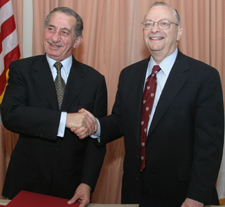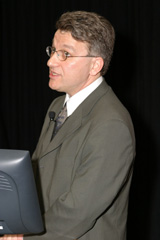|
June 16, 2004
|
||||||||||||
Noting the significance of international environmental health efforts for current and future generations, the President of the Republic of Cyprus and the Dean of HSPH, along with other members of the Cypriot government and School faculty, announced a new initiative at a special event on June 1 in Snyder Auditorium. The government of Cyprus, in association with HSPH, will establish an international research, education, and training effort for the environment and public health. The World Health Organization has cited the Mediterranean region as a key area for protection and for concern about public health in the future, noted HSPH Dean Barry Bloom. Cyprus faces significant environmental challenges, such as seawater incursion into the island’s largest aquifer and increasing pollution from sewage and industrial waste. Addressing the President, Dean Bloom said that he looks forward to collaborative projects that will inform research on these and similar issues, adding: "The future is ultimately not just in our hands, but in the hands of our students and our children. We hope that this initiative will provide top-quality education and training in environmental and occupational health to students, scholars, and mid-career professionals. The initiative will disseminate important information on the environment and health to professionals in the region, [and] we hope, as well, to broader audiences." Said President of the Republic of Cyprus Tassos Papadopoulos, "We care about public health. We care about the environment because it touches upon the life of each and every individual in Cyprus, and not only our present generation but generations to come." He expressed the hope that Cyprus, historically at the crossroads of European and Asian cultures, will become "a regional center for research and excellence with the assistance of your institution."
The Government of Cyprus is contributing funds for both endowment and research grants to HSPH, as well as establishing a new Cypriot government-sponsored international research institute in Cyprus. The formal agreement was signed by President Papadopoulos and Dean Bloom at the Loeb House in Cambridge on June 2. A gala dinner followed. Attendees included Kitty and Michael Dukakis, former Democratic Party nominee for the U.S. Presidency; Euripides Evriviades, MPA ’84, Cyprus Ambassador to the United States; Peter Papanicolaou, Supreme President, Cyprus Federation of America, Metropolitan Methodios, the Metropolitan (Archbishop) of the Boston Metropolis of the Greek Orthodox Archdiocese of America; Konstantin Bikas, Consul General of Greece; Anastasia Michelle Papadopoulos, daughter of the President; James Ware, Dean for Academic Affairs; and John Lichten, Dean of Finance and Administration. At the event in Snyder Auditorium, Yiorgos Lillikas, Minister of Commerce, Industry, and Tourism, Republic of Cyprus, said the initiative will hold mutual benefits for its participants, adding: "There will also be benefits for Cyprus’ neighboring countries, since the environment does not have borderlines, and the solutions [to address] pollution of the environment must have at least regional, if not global, application." Joseph Brain, Chair of the Department of Environmental Health, and Petros Koutrakis, Professor of Environmental Sciences, described the goals of the initiative and how the effort is expected to be organized. Said Professor Brain: "We want to understand the environmental conditions in Cyprus. What is the air that people breathe? What water do they drink? What is the condition of the marine environment? What about the workplace?" Assessing the environment, he added, will aid understanding of the association between environmental conditions and human health.
The initiative will bring together researchers, educators, and practitioners from Harvard, Cyprus, Europe, the Middle East, and the Mediterranean region to confront environmental issues affecting the health of populations in that region. Training and education will take place at the new Cyprus International Institute for the Environment and Public Health in Cyprus and at the HSPH-Cyprus Program at the School. Professor Koutrakis provided an overview. Joint research projects and the development of local scientific expertise in Cyprus and the region will be two of the major objectives of the initiative. In addition, training through short courses and a one-year program in environmental health will be offered through the Cyprus International Institute. The institute will also serve as a think tank, where researchers can work with policymakers to translate scientific information into public policy, said Professor Koutrakis. To that end, large international conferences and symposia are expected to be convened periodically at the institute. HSPH will continue to offer master’s and doctoral degrees and postdoctoral research training at its Boston campus to qualified students from Cyprus and the region. Over the next decade, each year a minimum of five students from that region who have been admitted through HSPH’s regular processes will receive fellowships to the School, returning to their countries with new environmental knowledge and skills to practice and train others. Professor Koutrakis will direct the program at HSPH. In Cyprus, efforts will be directed initially by Philip Demokritou, Assistant Professor of Aerosol Physics in the Department of Environmental Health, who is taking a leave of absence from the faculty to get the new initiative under way. A video of the presentation in Snyder Auditorium is available at http://www.hsph.harvard.edu/cyprus/. Harvard Public Health NOW is published biweekly by the Office of Communications Harvard School of Public Health 665 Huntington Ave., SPH 1-1312 Boston, Massachusetts 02115 617-432-6052 Editor and Layout: Christina Roache Contributing Writers: Paula Hartman Cohen, Carisa Cunningham Calendar Editor: Melitta King Photos Credits: Suzanne Camarata, Richard Chase, Steve Gilbert Archived Issues || HSPH Home Copyright, 2004, President and Fellows of Harvard College |



